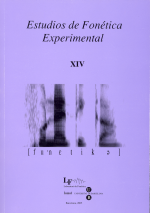Una primera aproximación a la prosodia del habla urbana de Sevilla
Abstract
Starting from the basis that the main approach of the research is based on a phonetic focus, with phonological, dialectologic and sociolinguistic implications, the currect research is aimed at offering the first steps recently carried out with the purpose of achieving the description of a group of simple affirmative sentences and absolute interrogative sentences of the SVO-type, based on an experimental-speech analysis of the urban speech from Seville. For that aim, the description of the prosodic features (intonation, characteristics of duration and intensity), drawn from a female Sevillian subject, aged 45 and with an average literacy, is finally dealt with attempting to establish the relationships between accent and intonation.
References
CANTERO SERENA, F.J. (2002): Teoría y análisis de la entonación, Universitat de Barcelona.
NAVARRO TOMÁS, T. (1944): Manual de entonación española, Nueva York, Hispanic Institute in the United States.
QUILIS, A. y J. FERNÁNDEZ (1964): Curso de fonética y fonología españolas, Madrid, CSIC.
SOSA, J. M. (1999): La entonación del español. Su estructura fónica, variabilidad y dialectología, Madrid, Cátedra.
Downloads
Published
How to Cite
Issue
Section
License

This work is licensed under a Creative Commons Attribution-NonCommercial-NoDerivatives 4.0 International License.
All articles published online by Estudios de Fonética Experimental are licensed under Creative Commons Attribution-NonCommercial-NoDerivs 4.0 International (CC BY-NC-ND 4.0 DEED), unless otherwise noted. Estudios de Fonética Experimental is an open access journal. Estudios de Fonética Experimental is hosted by RCUB (Revistes Científiques de la Universitat de Barcelona), powered by Open Journal Systems (OJS) software. The copyright is not transferred to the journal: authors hold the copyright and publishing rights without restrictions. The author is free to use and distribute pre and post-prints versions of his/her article. However, preprint versions are regarded as a work-in-progress version used as internal communication with the authors, and we prefer to share postprint versions.




